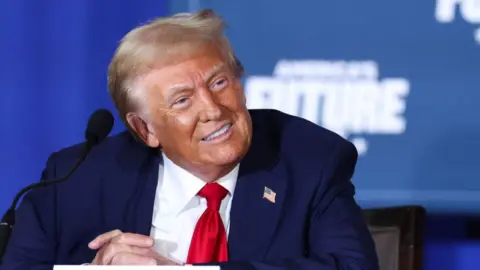Donald Trump is attempting to minimize the controversy surrounding his recent rally at Madison Square Garden, which featured a speaker whose remarks have been criticized as racist.
In an interview with Fox News anchor Sean Hannity, Trump stated that no one from his campaign had screened the comedian, Tony Hinchcliffe, who made the controversial jokes. He expressed uncertainty about the significance of the comments, suggesting that they might not warrant much attention. “Someone said some inappropriate things. Now they’re trying to link that individual to our party and blow it out of proportion,” Trump remarked. “I don’t see it as a major issue.”
The ‘problematic’ remarks by Hinchcliffe occurred during the rally, where he referred to Puerto Rico as a “floating island of hot garbage” and made derogatory comments about Black individuals and watermelons. These statements quickly elicited backlash from both Democratic and Republican leaders, underscoring a widespread disapproval of Hinchcliffe’s remarks.
When Hannity pressed Trump on whether he believed Hinchcliffe should have been part of the event, Trump responded, “Yeah, I’m not sure if it’s a significant issue.” This indicates a level of detachment from the consequences of the comedian’s comments, despite the considerable criticism that followed.
Trump’s response highlights a broader tendency to downplay incidents of racial insensitivity, often deflecting responsibility and attributing blame to individuals outside his campaign. This approach raises questions about the vetting processes within political rallies and the implications of allowing controversial figures a platform during such events.
As the fallout from the rally continues, observers are watching closely to see how it affects Trump’s base and the broader political landscape. The incident has sparked discussions about the accountability of political figures when it comes to the rhetoric presented at their events, especially as the country navigates an increasingly polarized environment.
The rally and its aftermath serve as a reminder of the delicate balance political leaders must maintain when it comes to public messaging and the individuals they choose to associate with. While Trump may be downplaying the incident, the societal implications of such comments cannot be easily brushed aside.
In an age where the repercussions of inflammatory language can be significant, political leaders are tasked with not only promoting their agendas but also addressing the broader societal issues that arise from their associations and the words of their speakers. This incident at Madison Square Garden may yet have lasting effects on Trump’s image and the Republican Party’s stance on issues of race and representation.
Ultimately, the conversations sparked by this event reflect ongoing tensions in American society regarding race, identity, and the role of comedy in public discourse. As the rally fades from the headlines, the conversations it has ignited will likely persist, continuing to shape the narrative around Trump’s political identity and the Republican Party’s future.
Discover how this election will affect American workers:


